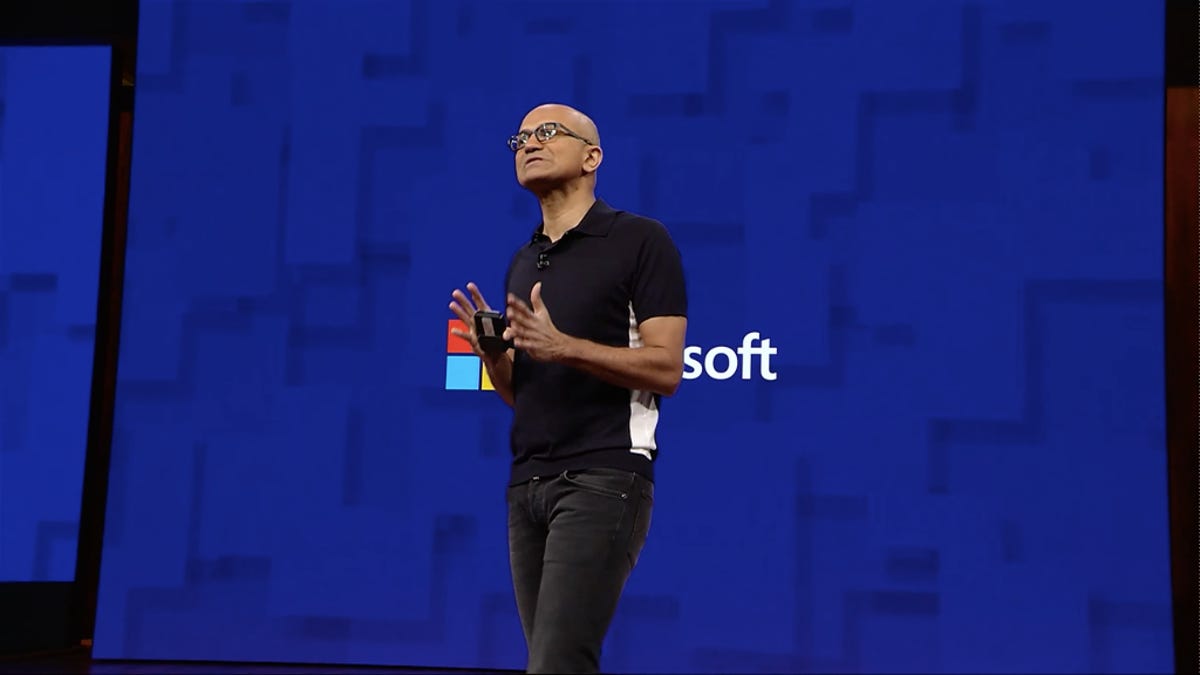Microsoft's Nadella thinks AI can improve tech for people with disabilities
The software giant unveils a $25 million, five-year initiative, called Accessibility for AI, to help fund new apps and products.

Microsoft CEO Satya Nadella on stage at last year's Build conference.
For years, technology features for people with disabilities have felt like an afterthought. Microsoft is hoping to change that.
The tech giant announced Monday a $25 million, five-year program to encourage software and device developers to design products using artificial intelligence that are aimed at the disabled community. Think apps that describe what people see, better text-to-speech technology and predictive text so people don't have to type as much.
"Artificial intelligence is beginning to have an impact on the lives of people with disabilities, but it's only going to grow," said Satya Nadella, Microsoft's CEO whose son has cerebral palsy. Speaking at Microsoft's Build developer conference in Seattle Monday, Nadella said showed how technology, like the company's SeeingAI app that narrates out loud whatever your phone's camera is pointed at, can help make people's lives better.
While $25 million isn't a whole lot to a company that rang up $8.6 billion in profits last year, Microsoft sees this pitch as a wakeup call to academics, NGOs and researchers to begin using AI in new ways when developing products and services.
Microsoft isn't the only company that says AI's time is coming. Facebook, Google and Apple have been amping up their talk about AI as a way to sort through photos, curb bad behavior on social networks and help us perform otherwise menial tasks (like reserving a table for dinner and ordering movie tickets).
Microsoft, whose Windows software powers nearly nine out of 10 computers on the planet, has been focused on AI as a way to both push technology forward and, of course, connect it to Microsoft programs. The company has been advancing speech-to-text, for example, in order to offer real-time translation during calls on its Skype messaging service.
On stage in front of more than 6,000 software and hardware developers in downtown Seattle, Microsoft showed how a drone could survey a series of pipes, identify cracks, and automatically alert repair workers using Microsoft software.To do this, the company set out a set of five industrial pipes, one of which had a break in it.
As the drone flew over them, it detected the "anomaly," and then could send a message to repair crews."In the real world there are hundreds of pipes over thousands of miles," so this could save a lot of time and effort, said Sam George, head of one of Microsoft's online services teams.
Even more data
Although Microsoft's pitch focuses on how its technology can spread even more into our lives, it has good reasons to push.
This year, there are estimates that more devices will be connected to the internet than there are people on Earth. By 2020, the average city will generate 250 petabytes of data each day, made up of everything from documents at work to sensor information from street corners. That's equivalent to more than 300 million photos -- each day.
Microsoft says it sees an enormous opportunity for people who can harness that information. It will likely further push the use of AI, a technology in which tech luminaries see both benefits and potential dangers.
Tesla CEO Elon Musk, for instance, often warns that AI could spark WW III. Meanwhile, Facebook CEO Mark Zuckerberg has focused his AI efforts toward happier stuff, like sorting photos, weeding out bad behavior on his social network and testing its apps.
It'll take a "clear-eyed" approach to get the good out of artificial intelligence while avoiding the bad, Microsoft CEO Satya Nadella said at a talk in the UK last October. "I believe it's a design choice," Nadella said. "We want to create AI that empowers humans and make that a core, conscious design decision."
So while Microsoft is discussing the ethics of AI, it's also pushing companies do to the right thing with investments, including the $25 million AI for accessibility.
"This is an incredibly exciting time to be a developer," Nadella said. "I can't wait to see what you all build."
First published May 7 at 8:30 a.m. PT.
Update at 10:27 a.m. PT: Adds comments from Nadella.
Microsoft Build 2018: CNET's coverage of Microsoft's developer conference.
Tech Enabled: CNET chronicles tech's role in providing new kinds of accessibility.

